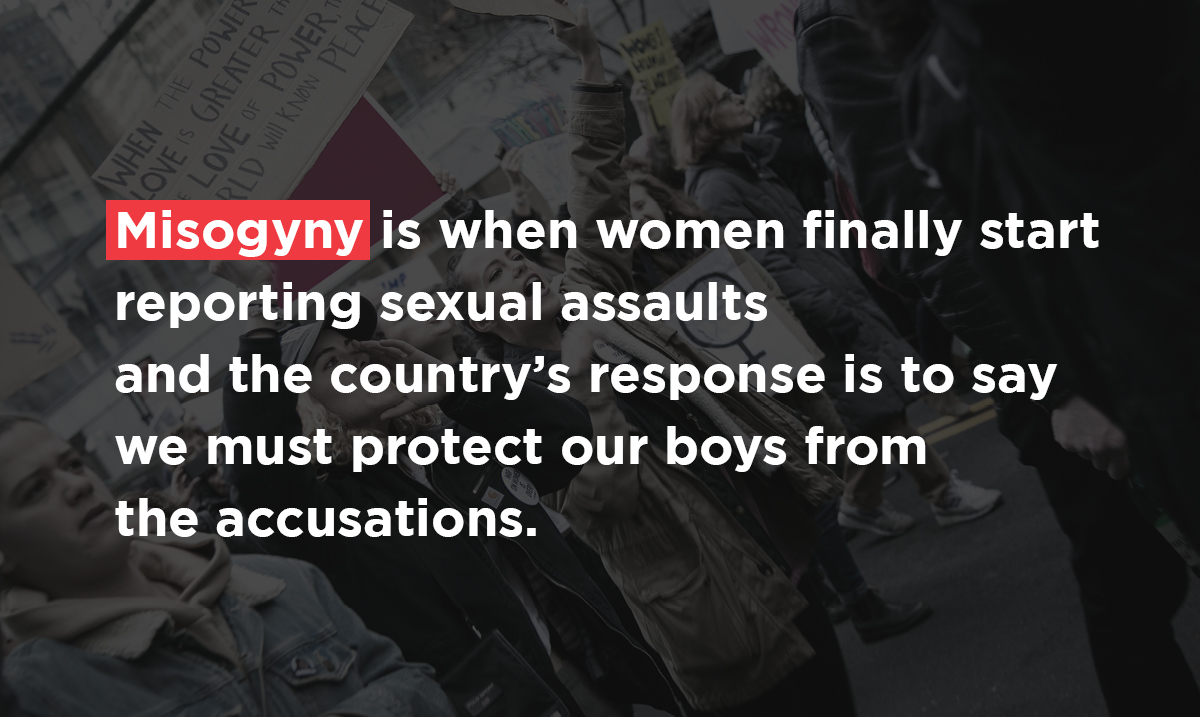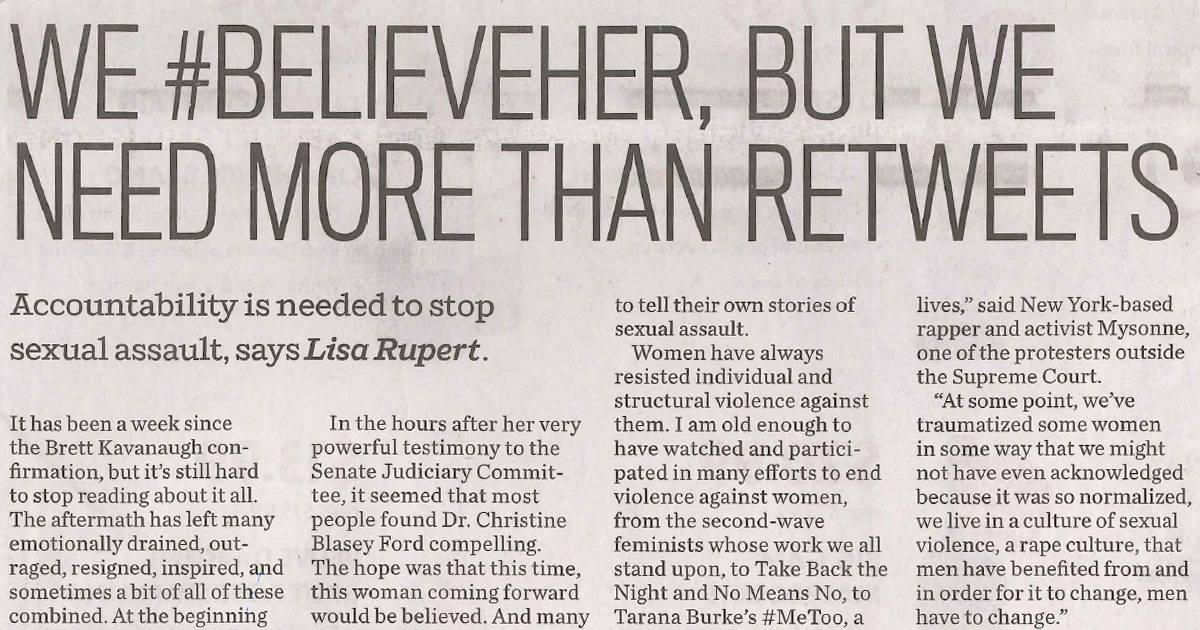
We #BelieveHer, but We Need More Than Retweets to Change Culture
At the YWCA, we believe gender equality can only be achieved when women and men work together to create a more just and equal society for everyone. Engaging boys and men in our work is key, and we recognize the many male allies who support our work.
#MeToo. #TimesUp. #WhyIDidntReport. #BelieveSurvivors.
It was a reckoning.
All of these hashtags were born from a groundbreaking movement that signalled a shift in the way we look at sexual assault. It was a chance for us to truly take stock of the degree to which we have normalized, permitted and even protected sexual assault, especially when it’s perpetrated by powerful men.
But how have things changed since?
We are entering this year’s Week Without Violence with anguish and disbelief. Even in the face of a post-#MeToo era, we saw just last week how a man’s reputation can and will be valued over a woman’s experience. Despite having nothing to gain, despite putting herself and her family in an incredibly threatening spotlight, and despite being made to relive her trauma - beyond not being believed, this survivor was cruelly mocked, by the most powerful man on earth, no less. And we wonder why survivors are afraid of coming forward.

These recent events have illuminated the reality of the culture we’re living in - a culture in which women are the vast majority of sexual assault survivors.
A culture in which survivors are too afraid to come forward, because they know they’ll likely be blamed rather than believed (take a look at the #WhyIDidntReport hashtag.)
A culture that breeds the perpetration of sexual assault, because it inherently favours men over women, at all levels - from the gender pay gap, to the discrepancy in the hours of unpaid care men and women take on, to the language we use (have you ever insulted a man by calling him a girl?)
A culture that labels women who speak up as “angry feminists,” discrediting their perspectives and lived experiences.
These hashtag movements were pivotal - they shone a light on the sheer magnitude of sexual assault, and taught us why so many survivors are afraid to speak up. They created a sense of connection between survivors from all over the world and kickstarted critical and long-overdue conversations about how we treat sexual assault and view gender-based violence. And perhaps most importantly, they showed us how important it is to rally around survivors, and ensure they’re heard and believed.
But it’s not enough to simply believe survivors. That’s just the first step.
We’re tired and angry, and we’re calling upon our allies, friends and brothers and sisters. We need to take action and address the root cause: a culture of denigrating and dismissing women for so long, that it's woven into our social fabric and considered normal. It’s a culture that has made some amazing progress, but still has miles to go in achieving gender equality. It’s one that is conducive to sexual assault, victim-blaming and has fundamentally kept survivors firmly in a place of shame, guilt and fear.
We must believe survivors, stand up for them and undo the culture that’s bred the widespread sexual assault of women.
Because at the end of the day, “believing Ford wasn't enough to keep her alleged assailant from earning a spot on the Supreme Court.” - Marie Solis
It’s a deeply entrenched culture
It’s not hard to believe that a culture that gaslights, undermines and objectifies women, is also one in which sexual assault and the subsequent silencing of survivors is able to flourish. It all goes much deeper than we realize.
It’s ingrained in our everyday language. Common phrases like “don’t be such a girl” devalue women, and perpetuate the archaic attitude that they’re weak, overly emotional and therefore unable to be trusted. When your idea of an insult is “stop being such a girl”, what you’re really saying is women are weak and pathetic, and being one is undesirable.
It also just takes a simple Google search of “female hysteria” to find that the notion of calling women “crazy” to keep them under control has been around for thousands of years. It’s a perfect example of oppressive language. The easiest way to dismiss a person’s experience is by accusing them of being crazy, dramatic or irrational. This is what survivors have to look forward to if they speak up.
Victim blaming is real. When you hear of a sexual assault, how often is your initial reaction to think about how the victim may have contributed? Perhaps it was what she was wearing, her decision to walk alone at night, or how drunk she was. Sure, everyone needs to practice basic awareness, but we need to ask ourselves: why are our initial thoughts on the victim’s actions instead of the perpetrator’s?
Treating women as objects to be had rather than as fellow human beings is another insidious way our culture has been permissive of sexual assault. We live in world where women and girls continue to be sexualized. Research shows that the sexualization of women and girls and the corresponding hypermasculinization of men and boys are linked to unhealthy relationships, increased mental health problems and gender inequality. Hypermasculinity – also known as toxic masculinity – refers to the narrow ideas about what it means to “be a man”. It’s the emphasis of male stereotypical behaviours like “boys don’t cry”, “boys have to be strong” and “sexual prowess”. On a societal level it encourages dominance and contributes to the tolerance of violence against women.
So, let’s take some time to reflect: what have we all unknowingly done to contribute to this culture? Have we remained silent when a friend talked about his “crazy ex-girlfriend,” and went on to undermine her emotions? How often have we excused a man’s feeling of entitlement to a woman’s body as “just giving her a compliment” when he catcalled her on the street? Have we ever read of a sexual assault and thought “she shouldn’t have been so drunk”? To what end will we justify men’s actions with “oh they’re just being boys”?
We shrug off this behaviour because it’s so prevalent. We’ve accepted it as normal. It’s normal to objectify women. It’s normal to see them as a thing to be won over. It’s normal to discredit them because they’re too emotional to be rational. And as we said, there’s thousands of years backing this up.
This is the culture we’re fighting against. So many years of it. And it’s okay to be angry - we are. Anger’s message is, ‘I don’t like this. Something needs to be different about this situation.’ Here’s how you can make it different.
What can you do to help
Self-reflect
This is the first step. Because this culture is so deeply ingrained in our daily lives, it’s really difficult to see. How have we unknowingly contributed? Have we kept mum when we should have spoken up, or made excuses for someone’s behaviour? It’s time to think about the seemingly insignificant ways we may have added to a culture that diminishes women’s experiences, objectifies them, tolerates violence against them and dismisses them when they do speak up.
Acknowledge and take responsibility
It’s okay to admit that you’ve probably done something that you’re not proud of. We’re human and we make mistakes, but what matters is how we respond when we realize we’ve erred. We need to own that we may have behaved problematically in the past and should look at overcoming some of our biases. We must hold ourselves accountable for our actions.
Commit to changing
One of the easiest ways to play your part as an ally, and help eradicate a culture that tolerates violence against women, is by changing how you speak.
The next time you hear someone say something like “don’t be such a girl” or “she’s just crazy”, speak up and question their choice of language. If you hear phrases like “I’d tap that” or “we just got raped by that team”, let them know that they’re actually making rape a joke, and suggest another way they could phrase what they’re trying to say.
We also need to start supporting survivors in tangible ways. Allow stories to be shared. Create safe spaces. Listen to understand. Believe and validate stories. Ask what you can do to help. Point them to the right resources.
We NEED to be vocal with our support.
In her Marie Claire article, Josephine Yurcaba says “When I share my story, I receive silent “likes” and retweets, but few actual messages of support. I can count the number of men in my life who spoke out in support of Ford on one hand. And that’s why Kavanaugh was confirmed: Our culture is one that still leaves survivors to fend for themselves.
To change that, we have to start publicly, vocally, and directly supporting survivors.”
While this incredible movement’s groundswell began with just a hashtag and taught us the importance of believing survivors, it’s time to go beyond. And men, we need your help. It’s time to reflect, recognize and hold ourselves and each other accountable. Start conversations, call out problematic behaviour and harmful language, loudly show your support for survivors and stand with them in solidarity.
We need the other half of the population. We can’t do it without you.
We need men to be allies to women in the struggle to end violence against women. Women have researched, strategized, advocated for change, staffed rape crisis lines and transition houses, protested, and provided emotional and practical supports to each other. But women cannot change culture and systems on their own. Men need to hear the words of the #MeToo movement, believe survivors, change their own behaviour, to challenge the behaviour of other men around violence against women, and to work with women to change the structures of power that uphold it.
Let’s shift culture together.
Join the discussion on Facebook:
In the Media
Vancouver Sun
Opinion: We #BelieveHer, but we need more than retweets — we need men to step up.
By Lisa Rupert


